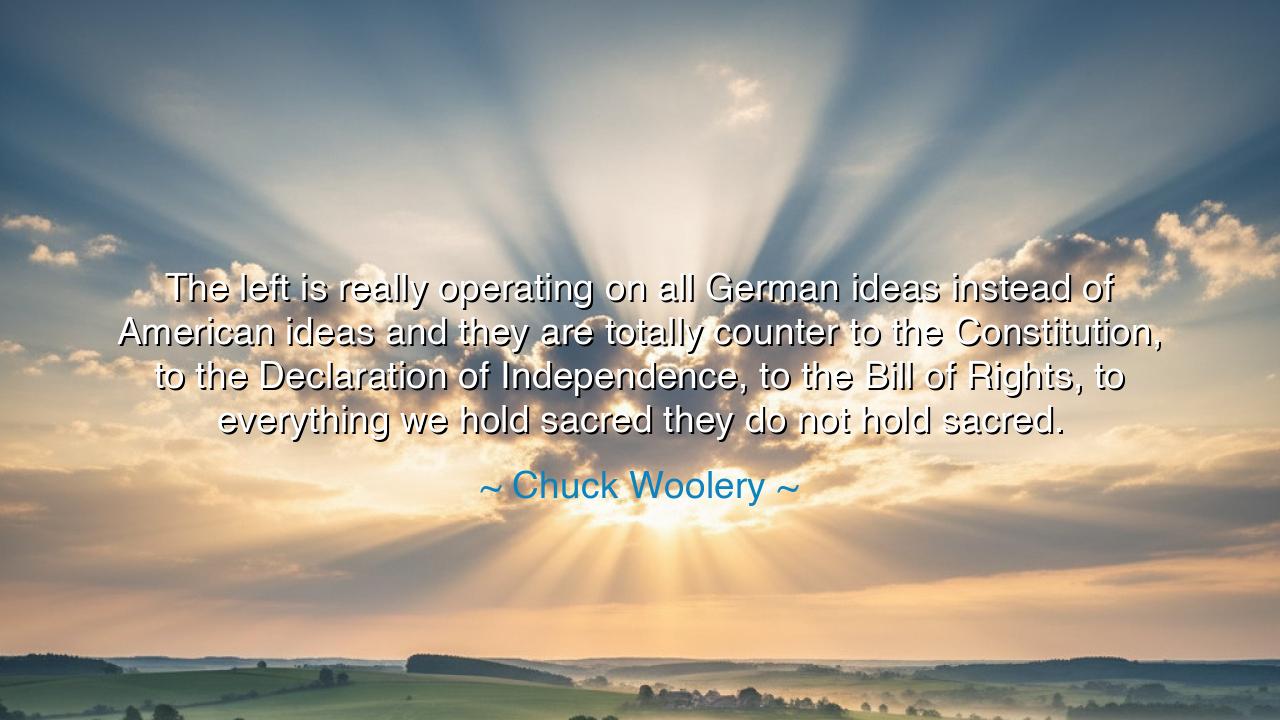
The left is really operating on all German ideas instead of
The left is really operating on all German ideas instead of American ideas and they are totally counter to the Constitution, to the Declaration of Independence, to the Bill of Rights, to everything we hold sacred they do not hold sacred.






In an age of turmoil and division, the voice of Chuck Woolery, once known for the simplicity of entertainment, rose with an unexpected gravity, declaring: “The Left is really operating on all German ideas instead of American ideas, and they are totally counter to the Constitution, to the Declaration of Independence, to the Bill of Rights, to everything we hold sacred they do not hold sacred.” These words, though steeped in the passion of a nation at odds with itself, reveal something far older than politics — a warning that echoes from the dawn of republics to the fall of empires: a people who forget their founding principles will one day lose the freedom those principles were meant to preserve.
To understand the heart of this statement, we must look not at parties, but at ideas — for Woolery speaks not merely of factions, but of philosophies. The “German ideas” to which he refers are not of the German people, but of the ideological movements that arose from nineteenth- and twentieth-century Europe: collectivism, socialism, and statism — systems that place the power of the state above the liberty of the individual. In contrast, the “American ideas” he defends are those of natural rights, individual sovereignty, and limited government — the sacred triad enshrined in the Constitution, the Declaration of Independence, and the Bill of Rights. These are the principles that declare man free not because the state grants it, but because God ordains it.
When Woolery warns that one side has strayed from these foundations, he speaks with the same anguish that has haunted many a patriot throughout history. Thomas Jefferson, in his own time, feared that the republic could decay into tyranny if its citizens forgot that government was their servant, not their master. Likewise, Abraham Lincoln, when facing a nation divided, reminded the people that “a house divided against itself cannot stand.” Woolery’s lament is born from that same ancient fear: that the sacred flame of liberty, kindled in the hearts of America’s founders, might be dimmed by the cold philosophies of control.
Consider the contrast he invokes — the Constitution as the covenant of liberty, written in the blood of revolution; the Declaration of Independence as the cry of the human soul against all forms of domination; the Bill of Rights as the shield of the individual against the tyranny of the many. These were born of American imagination, not European ideology — of men who believed not in the perfectibility of the state, but in the imperfection of man, and therefore the necessity of restraint. They did not trust power to cure evil, for they knew power itself could become the greatest evil.
The “German ideas,” in Woolery’s sense, are those of Hegel, Marx, and their disciples — the belief that the collective must subsume the individual, that the state must shape the citizen, that progress demands obedience to a vision of social engineering. From these seeds came the totalitarian doctrines of the twentieth century, when freedom was sacrificed upon the altar of utopian promises. The world has seen what happens when ideology dethrones conscience — when man ceases to be an end in himself and becomes a means to another’s design. Woolery’s warning is not merely political, but moral: beware the ideas that glorify the state and forget the soul.
This struggle between liberty and authority, between the American ideal and the imported dream of enforced equality, is not new. It is the ancient battle between those who believe that man is born free and those who believe he must be made so by decree. It is the same conflict that tore Europe apart in the last century, and which now whispers again in the hearts of nations that have grown weary of freedom’s burden. For liberty requires courage, self-restraint, and the humility to live without control over one’s fellow man — virtues easily lost in times of fear or plenty.
Let us, then, take the lesson from Woolery’s impassioned cry. Whether one agrees with his politics or not, the wisdom remains: cherish the principles of freedom, for they are delicate and perishable things. Guard the Constitution not as an artifact, but as a living covenant; teach your children the meaning of independence not as rebellion, but as responsibility. Resist all ideologies — from any direction — that promise safety in exchange for submission, for such bargains always end in bondage.
And so, remember this truth as old as civilization itself: a free people must love freedom more than comfort, and truth more than power. The spirit of America — the belief that rights come from God, not government — must never be forgotten. For when men cease to hold sacred what is sacred, the world once again becomes ruled not by conscience, but by force. And that, as history has shown in the rise and fall of empires, is the surest path from light into darkness.






AAdministratorAdministrator
Welcome, honored guests. Please leave a comment, we will respond soon